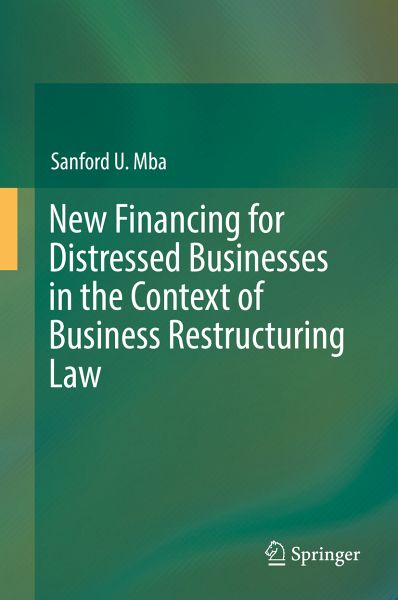
New Financing for Distressed Businesses in the Context of Business Restructuring Law (eBook, PDF)
Versandkostenfrei!
Sofort per Download lieferbar
72,95 €
inkl. MwSt.
Weitere Ausgaben:

PAYBACK Punkte
36 °P sammeln!
This book focuses on the restructuring of distressed businesses, emphasizing the need for new financing during the restructuring process as well as during relaunch, and examines the role of law in encouraging creditor confidence and incentivizing lending. It describes two broad approaches to encouraging new finance during restructuring: a prescriptive one that seeks to attract credit using expressly defined statutory incentives, and a market-based one that relies on the business judgment of lenders against the backdrop of transaction avoidance rules.Securing new financing for a distressed busi...
This book focuses on the restructuring of distressed businesses, emphasizing the need for new financing during the restructuring process as well as during relaunch, and examines the role of law in encouraging creditor confidence and incentivizing lending. It describes two broad approaches to encouraging new finance during restructuring: a prescriptive one that seeks to attract credit using expressly defined statutory incentives, and a market-based one that relies on the business judgment of lenders against the backdrop of transaction avoidance rules.
Securing new financing for a distressed business is a critical part of successful restructuring. Without such financing, the business may be unable to meet interim liquidity constraints, or to implement its restructuring plans. This book addresses related questions concerning the place of new financing as an essential component of restructuring.
In general terms, the book explores how statutory interventions and the courts can provide support with contentious issues that arise from the provision of new financing, whether through new financing agreements or through distressed debt investors, who are increasingly gaining prominence as sources of new financing for distressed businesses. It argues that courts play a key part in preventing or correcting the imbalances that can arise from the participation of distressed debt investors. In this context, it critically examines the distressed debt market in emerging markets like Nigeria and the opportunity presented by non-performing loans, arguing that the regulatory pattern of market entry may dis-incentivize distress debt investing in a market that is in dire need of financing.
The book offers a fresh and comparative perspective on restructuring new financing for distressed businesses by comparing various approaches (primarily from the US, UK and Germany) and drawing lessons for frontier markets, with particular reference to Nigeria. It fills an important gap in international comparative scholarship and discusses a living problem with both empirical and policy aspects.
Securing new financing for a distressed business is a critical part of successful restructuring. Without such financing, the business may be unable to meet interim liquidity constraints, or to implement its restructuring plans. This book addresses related questions concerning the place of new financing as an essential component of restructuring.
In general terms, the book explores how statutory interventions and the courts can provide support with contentious issues that arise from the provision of new financing, whether through new financing agreements or through distressed debt investors, who are increasingly gaining prominence as sources of new financing for distressed businesses. It argues that courts play a key part in preventing or correcting the imbalances that can arise from the participation of distressed debt investors. In this context, it critically examines the distressed debt market in emerging markets like Nigeria and the opportunity presented by non-performing loans, arguing that the regulatory pattern of market entry may dis-incentivize distress debt investing in a market that is in dire need of financing.
The book offers a fresh and comparative perspective on restructuring new financing for distressed businesses by comparing various approaches (primarily from the US, UK and Germany) and drawing lessons for frontier markets, with particular reference to Nigeria. It fills an important gap in international comparative scholarship and discusses a living problem with both empirical and policy aspects.
Dieser Download kann aus rechtlichen Gründen nur mit Rechnungsadresse in A, B, BG, CY, CZ, D, DK, EW, E, FIN, F, GR, HR, H, IRL, I, LT, L, LR, M, NL, PL, P, R, S, SLO, SK ausgeliefert werden.












